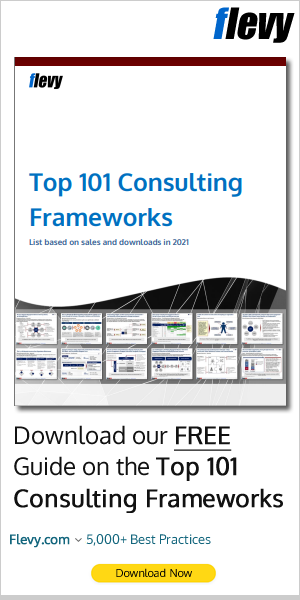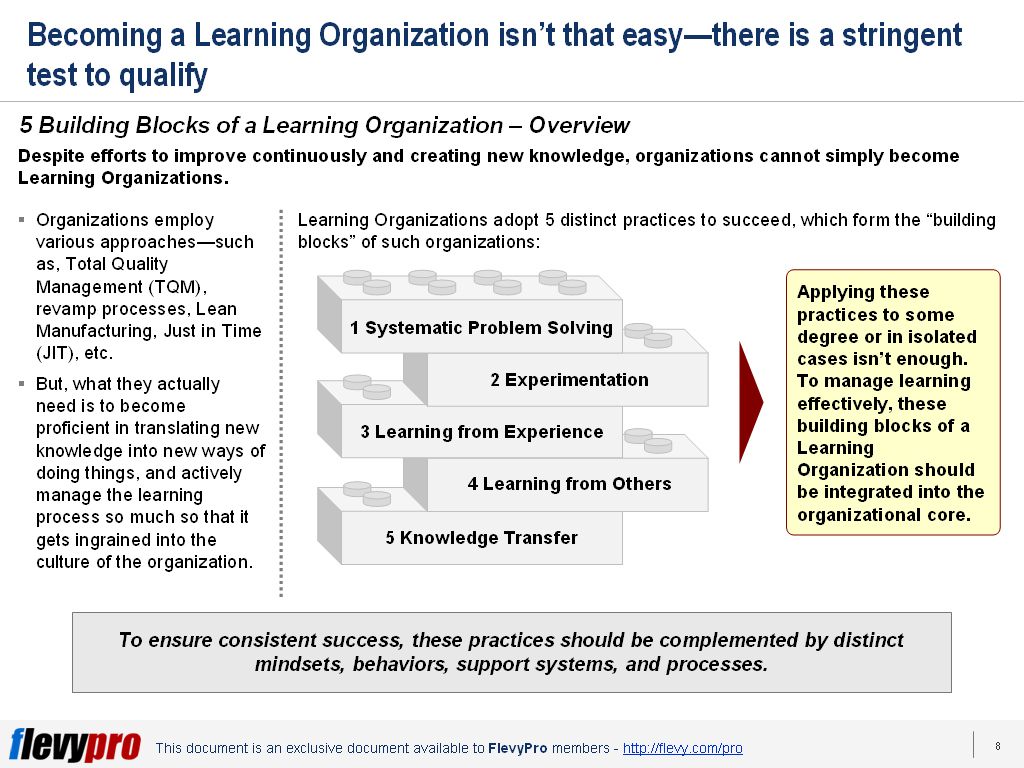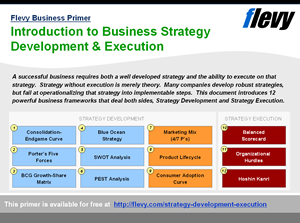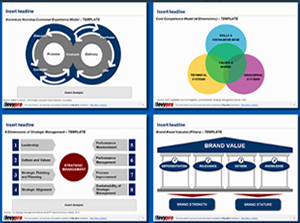Editor's Note: Take a look at our featured best practice, Corporate Learning Strategy (26-slide PowerPoint presentation). Although organizations invest heavily in Learning and Talent Development, most CEOs complain about the shortage of learned managers and leaders. Research reveals that a number of managers consider employee performance to remain the same if their organization's Learning function is totally [read more]
The 5 Building Blocks to Developing a Learning Organization
* * * *
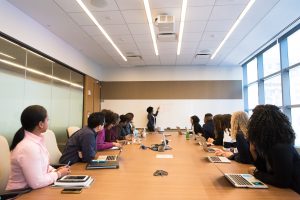
Scholars have defined a Learning Organization in many different ways. Some suggest it as an organization skilled at creating, acquiring, and transferring knowledge, and at modifying its behavior to reflect new knowledge and insights. Marlene Fiol and Marjorie A. Lyles describe organizational learning as “the process of improving actions through better knowledge and understanding.” Barbara Levitt and James G. March define organizations as “Learning Organizations when they encode inferences from history into routines that guide behavior. Chris Argyris categorizes organizational learning as “a process of detecting and correcting error.” According to Peter Senge, “a Learning Organization is a group of people working together collectively to enhance their capacities to create results they care about.”
Being a Learning Organization offers several advantages. A perpetual influx of insights and new experience keeps the organization dynamic and ready for transformation; assists in better management of investments, improves efficiency; and helps in developing cost leadership and differentiation strategies. Learning Organizations tend to be more innovative by encouraging people to learn, develop, and by generating a more innovative environment. Shared learning builds the corporate image of the organization and increases the pace of change within the organization. Learning Organizations provide their people the ability to think insightfully about complex problems, take coordinated action, improve decision making, and instill a sense of community in them.
Despite efforts to improve continuously and creating new knowledge, organizations cannot simply become Learning Organizations. They employ various approaches but what they actually need is to become proficient in translating new knowledge into new ways of doing things, and actively managing the learning process so that it gets ingrained into the organizational culture.
Becoming a Learning Organization necessitates mastering 5 key activities. These 5 activities form the building blocks of a Learning Organization and should be integrated into the organizational core to transform your company into a Learning Organization.
- Systematic Problem Solving
- Experimentation
- Learning from Experience
- Learning from Others
- Knowledge Transfer
Applying these practices to some degree or in isolated cases isn’t enough. To ensure continued success, these practices should be complemented by distinct mindsets, support systems, and processes.
Let’s now discuss the first 3 building blocks in detail.
1. Systematic Problem Solving
Systematic problem solving is based on scientific methods for diagnosing problems, e.g., the Plan, Do, Check, Act (PDCA) cycle or “hypothesis-generating, hypothesis-testing.” The technique employs fact-based management, relying on concrete data instead of assumptions for making decisions and utilizes statistical tools—such as Pareto charts, histograms, correlation, and cause and effect diagrams—to consolidate data and draw conclusions.
For a real Learning Organization, people need to become more disciplined, pay more attention to detail, assess underlying causes, and analyze data before reaching decisions.
2. Experimentation
Experimentation involves systematic exploration and testing of new knowledge. Experimentation has 2 fundamental configurations; both forms transfer knowledge and yield new insights, capabilities, tools, techniques, and processes:
- Ongoing programs
- Demonstration Projects
Ongoing Programs
Ongoing programs entails a chain of small experiments aimed at yielding incremental gains in knowledge. These programs maintain a steady flow of new ideas by sending workforce on sabbaticals at different places to learn new work practices and tools from industry and academia, and applying that knowledge to their daily routines. Such programs foster risk taking and a feeling of “benefits of experimentation far outweigh the costs.”
Demonstration Projects
Demonstration projects are one of a kind, large-scale initiatives that include holistic system-wide transformation targeted at a single site. These projects are executed with a goal of developing new organizational capabilities using a “clean slate” approach.
Self-managing, multi-departmental teams; high level of employee autonomy; considerable “learning by doing;” course corrections; implicit policy guidelines, precedents, and decision rules are the key characteristics of demonstration projects.
3. Learning from Experience
Learning Organizations gain valuable knowledge from their past experiences, by doing an exhaustive and systematic appraisal of past successes and failures. However, not too many managers pay attention to past experiences or reflect on those, eventually losing valuable insights. To inculcate a culture of learning, lessons learned should be recorded and made readily accessible to all employees.
A handful of companies have laid out processes for their managers to contemplate on their past actions and incorporate those in their learning. At the core of this approach lies the belief that distinguishes productive failure from unproductive success. Productive failure delivers knowledge and understanding whereas unproductive success goes unnoticed where nobody knows what went well and why. Learning from experience approach isn’t that expensive—case studies and project reviews can be compiled with little cost.
Interested in learning more about the building blocks of a Learning Organization? You can download an editable PowerPoint on Learning Organization: 5 Building Blocks here on the Flevy documents marketplace.
Other Management Disciplines Relevant to Learning Organizations
to become a fully mature Learning Organization, it is important to also develop other disciplines and functions relevant to the same goals. Here are some to consider:
- Corporate Entrepreneurship: Corporate entrepreneurship encourages innovation, risk-taking, and new ventures within an organization. In a Learning Organization, fostering a culture of Corporate Entrepreneurship allows employees to explore new ideas, experiment with innovative solutions, and contribute to Continuous Learning and Improvement.
- Best Practices Transfer & Management: Management of Best Practices involves sharing successful strategies and processes across different parts of the organization. In a Learning Organization, promoting Best Practice Transfer ensures that valuable insights and successful approaches are disseminated, accelerating learning and improvement throughout the organization.
- Adaptive Leadership: Adaptive Leadership involves guiding an organization through change and uncertainty. In a Learning Organization, Adaptive Leadership supports the evolution of the organization’s learning processes and encourages a proactive approach to Problem Solving and Innovation.
- Innovation Management: Innovation Management focuses on systematically generating, capturing, and implementing innovative ideas. In a Learning Organization, Innovation Management supports the continuous exploration of new concepts and encourages experimentation as part of the learning journey.
- Change Management: Change Management addresses how organizations transition through shifts in Processes, Structures, or Culture. In a Learning Organization, effective Change Management ensures that learning and adaptation become integral parts of the organization’s response to change, fostering Business Resilience and Growth.
- Knowledge Management: Knowledge Management involves capturing, organizing, and sharing organizational knowledge. In a Learning Organization, effective Knowledge Management facilitates the dissemination of insights gained through systematic Problem Solving, experimentation, and learning from experience.
- Continuous Improvement: Continuous Improvement focuses on incrementally enhancing processes and systems. In a Learning Organization, Continuous Improvement becomes a central tenet, encouraging employees to constantly seek opportunities for growth and refinement in their work.
- Feedback Culture: A Feedback Culture encourages open communication and constructive feedback. In a Learning Organization, a robust Feedback Culture supports ongoing improvement, as employees receive insights that enable them to adjust their approaches and enhance their learning.
- Digital Transformation: Digital Transformation involves leveraging technology to enhance business processes and operations. In a Learning Organization, Digital Transformation can facilitate the rapid exchange of knowledge, experimentation with new tools, and the adoption of innovative solutions.
- Risk Management: Risk Management involves identifying and mitigating potential challenges and uncertainties. In a Learning Organization, proactive Risk Management encourages a Culture of Experimentation, where failures are seen as opportunities for Learning and Growth.
- Employee Development and Training: Employee Development and Training ensure that employees have the necessary skills to excel in their roles. In a Learning Organization, Continuous Employee Development aligns with the organization’s commitment to learning, enabling employees to apply new knowledge and skills effectively.
- Data-Driven Decision Making: Data-Driven Decision Making involves using Data and Analytics to inform choices. In a Learning Organization, data-driven approaches support evidence-based learning, as insights gathered from data guide Problem Solving and improvement efforts.
Do You Find Value in This Framework?
You can download in-depth presentations on this and hundreds of similar business frameworks from the FlevyPro Library. FlevyPro is trusted and utilized by 1000s of management consultants and corporate executives. Here’s what some have to say:
“As a niche strategic consulting firm, Flevy and FlevyPro frameworks and documents are an on-going reference to help us structure our findings and recommendations to our clients as well as improve their clarity, strength, and visual power. For us, it is an invaluable resource to increase our impact and value.”
– David Coloma, Consulting Area Manager at Cynertia Consulting
“FlevyPro has been a brilliant resource for me, as an independent growth consultant, to access a vast knowledge bank of presentations to support my work with clients. In terms of RoI, the value I received from the very first presentation I downloaded paid for my subscription many times over! The quality of the decks available allows me to punch way above my weight – it’s like having the resources of a Big 4 consultancy at your fingertips at a microscopic fraction of the overhead.”
– Roderick Cameron, Founding Partner at SGFE Ltd
“Several times a month, I browse FlevyPro for presentations relevant to the job challenge I have (I am a consultant). When the subject requires it, I explore further and buy from the Flevy Marketplace. On all occasions, I read them, analyze them. I take the most relevant and applicable ideas for my work; and, of course, all this translates to my and my clients’ benefits.”
– Omar Hernán Montes Parra, CEO at Quantum SFE

Readers of This Article Are Interested in These Resources

|
|
30-slide PowerPoint presentation
|
|
27-slide PowerPoint presentation
| |||
About Mark Bridges
Mark Bridges is a Senior Director of Strategy at Flevy. Flevy is your go-to resource for best practices in business management, covering management topics from Strategic Planning to Operational Excellence to Digital Transformation (view full list here). Learn how the Fortune 100 and global consulting firms do it. Improve the growth and efficiency of your organization by leveraging Flevy's library of best practice methodologies and templates. Prior to Flevy, Mark worked as an Associate at McKinsey & Co. and holds an MBA from the Booth School of Business at the University of Chicago. You can connect with Mark on LinkedIn here.
Top 10 Recommended Documents on Learning Organization
» View more resources Learning Organization here.
» View the Top 100 Best Practices on Flevy.
